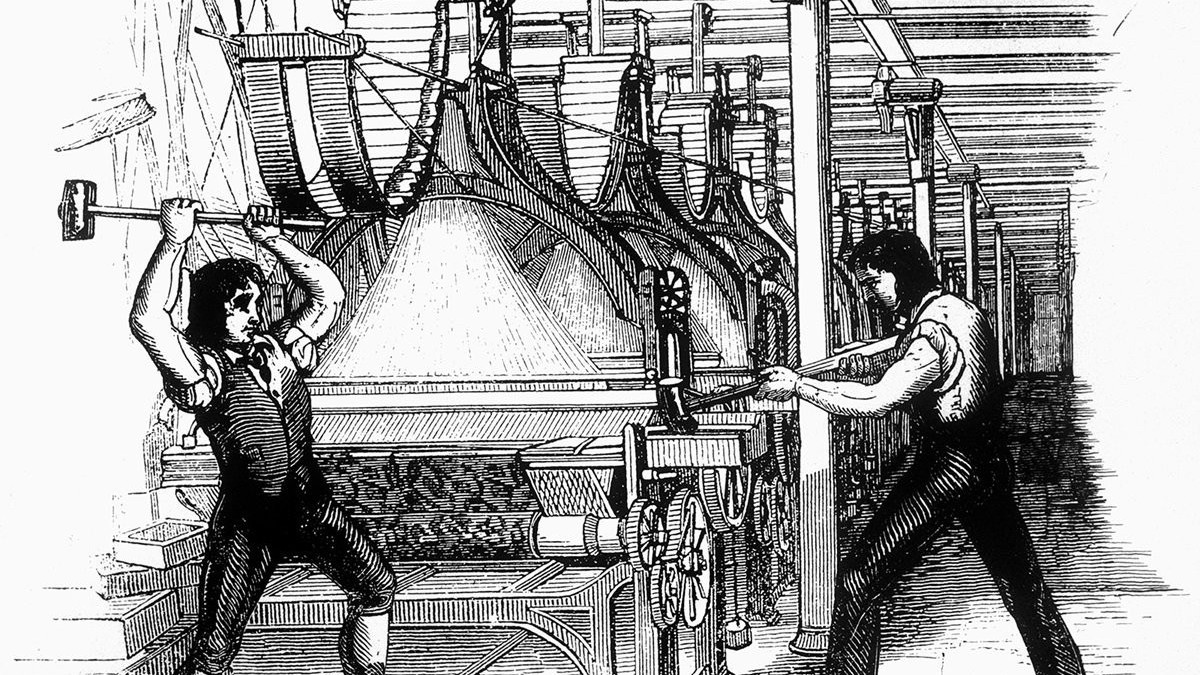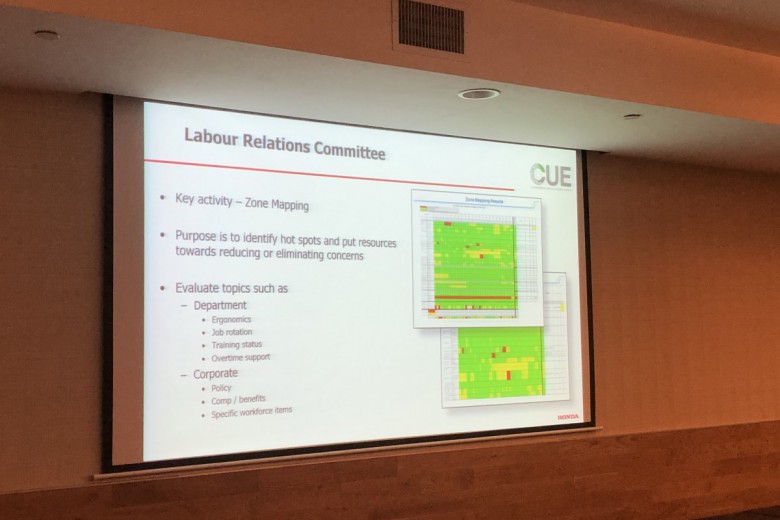Don’t want to go through invasive airport scanners? You must be a Luddite. Not convinced “smart guns” should be allowed? Another Luddite is holding back innovation. Skeptical whether digital technologies are going to revolutionize health care for the better? Let everyone know Dr. Luddite has arrived!
If you’ve heard the term “Luddite,” it’s probably in those sorts of scenarios. The Luddites are commonly misunderstood as backward technophobes who are incapable of adapting to the modern world. They’re anti-technology, and therefore against progress and the betterment of society.
This framing of the Luddites is convenient for tech capitalists who want nothing more than to have the public embrace whatever new products they deploy into our lives. If anyone dares to raise concerns about surveillance, privacy, or the assault on workers’ rights enabled by many of these new technologies, they’re quickly branded a Luddite in the hopes that people will disregard their critiques.
The Luddites were born out of what some call the first wave of capitalist automation. The Luddites weren’t backward technophobes – their story and mission were reframed by tech capitalists to serve their own interests. In the early 19th century, production was beginning to be mechanized in England and capitalists deployed stocking frames to speed up the labour of textile workers while reducing the quality and amount of labour required to produce textiles.
“In the 1800s, automation was not seen as inevitable, or even morally ambiguous. Working people felt it was wrong to use machines to ‘take another man’s bread,’ and so thousands rose up in a forceful, decentralized resistance to smash [the machines].”
Artisans in Nottinghamshire, Yorkshire, and Lancashire were concerned about capitalists using these machines to deskill and devalue their labour. The workers tried to bargain with local industrialists to set minimum wages and standards that would ensure the new technologies wouldn’t leave them worse off. They even sent letters to government officials in London asking them to step in and help them forge an agreeable compromise. But the factory owners weren’t having it, and the politicians were far too concerned with the Napoleonic Wars to care about the conditions of faraway textile workers. So the textile workers, or Luddites, took matters into their own hands and smashed the machines at the factories that wouldn’t meet their demands.
In Blood in the Machine: The Origins of the Rebellion Against Big Tech, Brian Merchant details that history and draws comparisons to the present. He explains that “in the 1800s, automation was not seen as inevitable, or even morally ambiguous. Working people felt it was wrong to use machines to ‘take another man’s bread,’ and so thousands rose up in a forceful, decentralized resistance to smash [the machines].”
In other words, the Luddites weren’t backward people who couldn’t get with the times. They didn’t have a problem with new technology, but with how capitalists were using technology to enrich themselves and make workers’ lives worse. The Luddites were determined to stop them. They may have lived more than 200 years ago, but their experience resonates with that of many workers today.
The tech industry loves to pretend that every new product or service it releases is going to upend whatever sector they’re targeting and be an unmitigated good for all. Yet when the excitement surrounding the financial speculation dies down, these promises go unfulfilled while investors make off like bandits.
We’re told these technologies will liberate us, but instead they’re enabling capitalists to hoard wealth and power and further squeeze the rest of us.
Right now, there’s a lot of hype over artificial intelligence (AI). Since the launch of ChatGPT in late 2022, we’ve been treated to endless headlines about how generative AI is going to transform everything: doctors will be replaced by chatbots, artists by image generators, and countless other professions will see at least some of their tasks taken over by these new tools. Workers are supposed to welcome these developments and let the people profiting off the technology set the rules for how it’ll operate.
But there’s very good reason to adopt a Luddite attitude toward what Big Tech is promising, especially since they did something similar 10 years ago. Remember in the mid-2010s when self-driving cars were going to replace truck and taxi drivers, robots were going to leave cashiers and waiters jobless, and rapid advancements in AI and automation were going to put millions of people out of work? Well, that never happened. New technologies were deployed in the workplace, but they didn’t replace human workers – rather they were used by bosses to increase surveillance, speed up the pace of work, further erode working conditions, and carve some people out of employment status altogether.
Take Uber and Amazon. Uber emerged in 2009 during the Great Recession and the company took advantage of the precarious labour left behind by the financial crash. It kicked off a wave of companies in what we now call the “gig economy,” promising convenience to consumers and flexibility to workers. But over a decade later, we can see the real project was to use the narrative of shiny new tech to wage a war on workers’ rights, place workers under algorithmic management, and diminish their power to fight back.
The Luddites knew what to do when their bosses imposed new technology and we shouldn’t be scared to learn from their example. If companies won’t relent and politicians won’t regulate to protect workers, we should be ready to smash the machines.
Amazon isn’t much different. Its warehouse workers are often still employees, but that’s rarely the case for its delivery drivers, who are hired through third-party firms. Delivery jobs are traditionally unionized and command pretty good salaries, but Amazon’s innovation has been to aggressively fight unions and lower the bar for workers in those industries. In the meantime, the company tracks every worker so it can push them to work faster, a strategy that has increased the risk of injuries among its warehouse workers. As reported by the Toronto Star in 2020, Amazon’s Canadian warehouses have an even greater injury rate than those in the U.S.
We’re told these technologies will liberate us, but instead they’re enabling capitalists to hoard wealth and power and further squeeze the rest of us. The Luddites knew what to do when their bosses imposed new technology and we shouldn’t be scared to learn from their example. If companies won’t relent and politicians won’t regulate to protect workers, we should be ready to smash the machines.




_780_520_90_s_c1.jpg)


